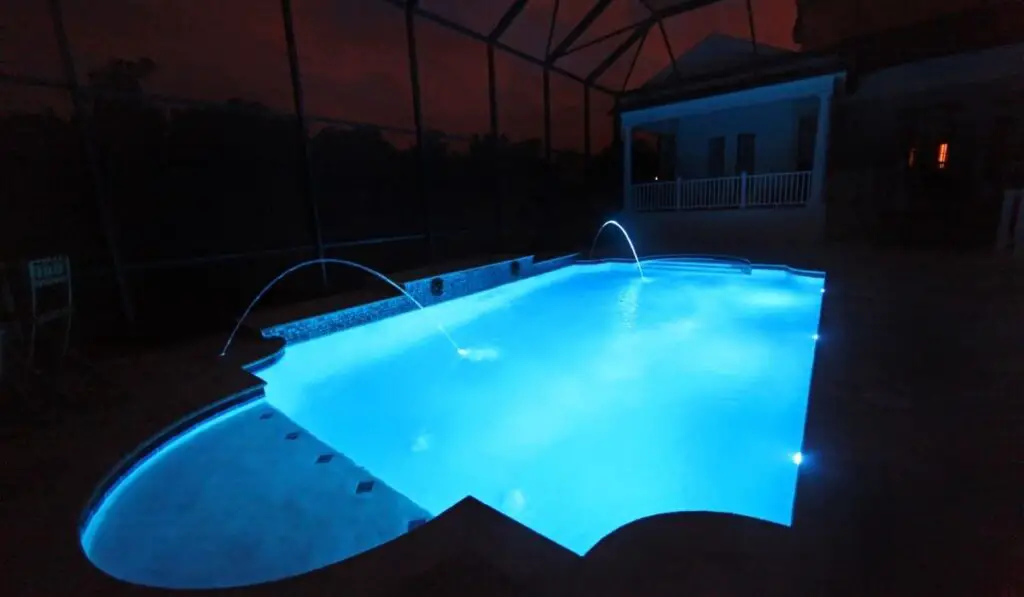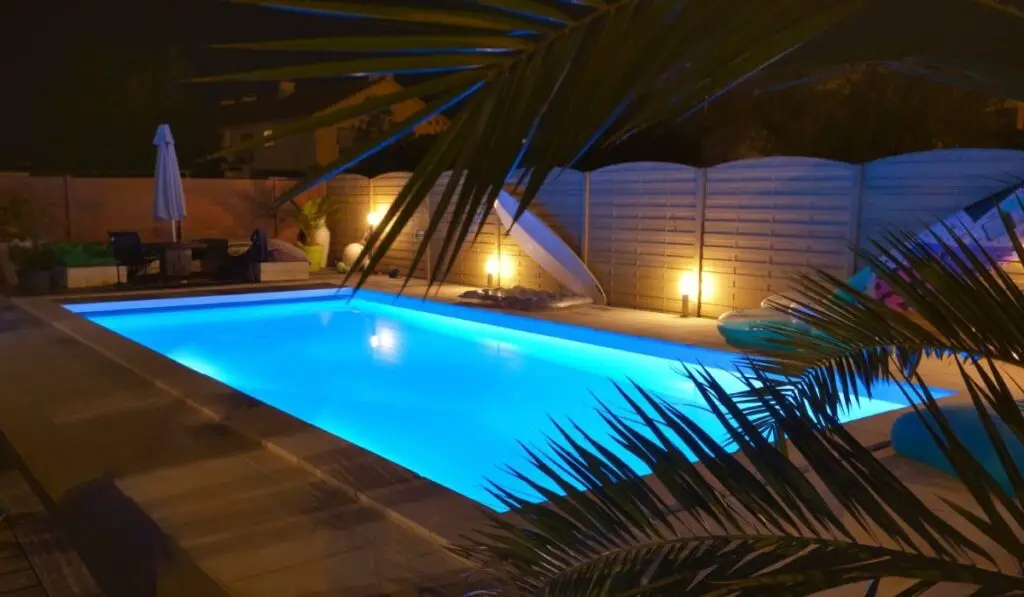Pool lights make a pool and its environs safe as they illuminate the walkways, ladders, stairs, patio furniture, and edges of the pool. They are usually attached to or embedded in the floors and walls of the pool, or placed at the surface of the water. But is it really safe to have electricity in the pool? Are pool lights safe?
Pool lights are very safe, especially the ones that were installed on your pool originally. Adding lights below the water surface after the pool is installed can be a hassle. Since you’re missing electricity and water, this isn’t recommended as a DIY project, but you can add more lights to a pool.
Pool lights in themselves are safe. However, the real problem is usually when the electricity flows through the rest of the equipment and not the pool light itself. What are the implications of water getting into a pool light? Is it safe to have lights in the pool? Can you be electrocuted in the swimming pool? Let’s look at these in this article, along with other questions. We’ll look into the dangers associated with installing pool lights in your swimming pool and preventive measures against electrocution.
Is it Safe to Put Lights in Swimming Pool?

As far as water and electricity are concerned, it is common knowledge that the two are not compatible. So if you’re going to install lighting in your in-ground pool, then you must ensure that the pool lights only create a beautiful ambiance without causing any unfortunate incidents.
It is generally safe to use pool lights. However, you must ensure that they are installed properly and maintained regularly to prevent any damage to the lights that could be a potential cause of electrocution.
Note that if you’re installing pool lights and any other electrical appliances in your pool, they have to be grounded and bonded. Pool lights should be installed according to proper guidelines and important precautions.
What Happens When Water is Electrified?
Electrocution in water is a serious and life-threatening danger to anyone who swims in such a pool or lake in which an electrical current is released by poorly maintained equipment or faulty wiring. This current enters a person’s body, paralyzing their muscles, and making them drown.
Many people are unaware of the fact that when they jump into a lake from their family’s boat or dive into a pool, they have just exposed themselves to the risk of getting electrocuted in the water.
Unfortunately, as the electricity passes through the body of the victim, he or she becomes a conductor. When this happens, their muscles become paralyzed, making them unable to swim, and they may eventually end up drowning.
Signs of Electrocution in Water
The following are signs that you or another swimmer is experiencing or is at risk of experiencing electrocution in water:
- Swimmers may feel tingly, suffer from muscle cramps, may be unable to move at all, and/or may feel as though they are being held in place by something.
- They may show signs of panic or discomfort.
- Other swimmers may hastily move away from a motionless swimmer or a certain area.
- Underwater pool lights may be flickering, not working properly, or working intermittently.
What causes electrocution in water?
Any of the following events can cause electrocution in water:
- Faulty electrical wiring on a boat, boat launch, or dock can lead to a release of electricity into the water, making the water energized.
- Old electrical wiring that has gone years without inspection.
- Faulty electrical wiring to the electric pool devices such as filters, pumps, vacuums, power cords, extension cords, switches, outlets, and lights.
- Absence of GFCI protection (Ground-Fault Circuit-Interrupters) for fixtures, switches, outlets, circuits, lighting, and other electrical receptacles.
- Extension cords and electrical appliances (like TVs and Radios) are pulled into or fell into the water.
What Causes Pool Electrocution?
Electrocution in pools is often caused by lighting, pool lights, extension cords, and electrical equipment. Electrical hazards in the pool and environs are dangerous and can lead to electrocution or death.
When putting up lights and other electrical appliances in the pool, ensure that you adhere to electrical safety guidelines to prevent electric shock. Let’s learn more about things that commonly cause pool electrocution, as well as preventive measures.
Pool Lights
Pool lights are a common cause of electrical hazards. Underwater lights are functional and create a beautiful ambiance, however, they are at risk of cracking.
Another risk besides that is a pool light with faulty sealing. This can cause the voltage produced by the light to make direct contact with water in the pool, which may electrocute swimmers.
Moreover, there is also a possibility of wear in the pool lights wiring which can also be a threat. Note that electricity can flow from the pool light if it is damaged or the wiring is faulty.
Non-functional or improperly installed pool lights are to be taken out of the pool. The reason is that it is no longer safe to make use of these lights. Ensure that you do a routine check of the lights and wiring, especially making sure that the wiring meets the code. Doing this can help you minimize the chances of the pool lights and wiring getting damaged.
Electrical Equipment
Electrical equipment is also a cause of electrocution in pools. The combination of electricity and water is dangerous, so you need to be very careful when installing electrical devices in your pool.
Avoid the use of devices that are not made for use in water, such as radios. If the device happens to fall into the water, an electric current can be generated.
If an electrical current is present in the water, a person can get electrocuted when they touch any metal fixtures of the pool such as the net handle or the ladder.
Furthermore, most electrical pool equipment may cause electrocution. Damaged wires in the equipment can create an electric current in the water, which can endanger the life of any swimmer in the pool.
Extension Cords
Extension cords should not be anywhere near the pool. The cords can get exposed to water easily and cause electrocution. There is a potential electric danger if water splashes from the pool to the cord.
Note that if the extension cord gets in contact with water, it can become faulty and only a little damage is enough to create an electric current. It is advisable to use battery-operated equipment and devices in the pool and environs instead of devices that you would have to plug into a cord.
The chances of electrocution accidents occurring are minimal if you avoid using cords in the pool area.
Lighting
Lighting is one of the causes of pool electrocution. Avoid using the pool when there is a storm. Even though there is only a slim chance of the pool water getting hit by lightning, it can happen.
When the water is hit by lightning, it will receive an electric current that can cause the same kind of danger as a faulty wiring or an electric cord falling into the water. In addition, there is a similar risk of electrocution when wired and running equipment is placed close to the pool.
How to Test Pool Water for Electricity
Pool water can be tested for electricity with the use of some devices, such as the Shock Alert (on Amazon). The device which runs on three AA batteries is inserted into the pool.
When the green light on the device is flashing, it indicates that the water is free of electricity so the pool is safe for use. However, when a red light flashes on the device, then some voltage is present in the water.
How often do People Get Electrocuted in Pools?
In recent years, there has been an increase in the number of pool electrocution cases. Between 1990 and 2003, the estimated number of deaths related to pool electrocution is 60, with the cases spread in different parts of the world and primarily including little children.
A teenager in Harris County, Texas got electrocuted in the pool in 2020 after having direct contact with naked light fixture wires in a hotel pool.
A father in Florida got electrocuted in 2016 during an attempt to rescue his daughter from electric shock in the family pool (the suspected cause was faulty wiring in one of the pool lights).
In the spring of 2014, a little boy died in a public pool in Miami because of incorrect wiring of a transformer into a 12V light. 120 volts was passing the ground wire of the pool lamp from a non-CFGI protected switch, causing corrosion of the lamp switch equipment. The voltage was released into the pool and the boy got electrocuted when he entered the water.
In Florida, many children landed in the hospital when they grabbed a pool handrail and got shocked while entering a public pool. The cause of the incident was traced to incorrect bonding and grounding in the bond room which made extremely high current flow through the bonding wire and enter the metal fixtures – underwater pool lights, ladders, and handrails.
In Houston, an elderly man died while trying to save a kid aged 11 from a hotel pool during the 2013 Labor weekend. The resident contractor for the pool used a permit without the appropriate code to set up the pool lights.
Most of these cases were a result of either incorrect grounding, bonding, or wiring (or any combination). These tragedies could have been averted with a GFCI (ground-fault circuit interrupter).
A GFCI checks the level of current that flows from hot to neutral and interrupts the circuit if an imbalance is detected. It detects imbalances as small as 4 or 5 milliamps and responds as fast as one-thirtieth of a second.
How to Protect Yourself from Pool Electrocution

The following safety tips can help avert electrocution from water in hot tubs and pools:
- Identify any underwater lights that no longer work well, work intermittently, or flicker.
- Know the locations of all the circuit breakers and electrical switches for your pool and know how to switch them off when an emergency occurs.
- Avoid swimming during a thunderstorm or after.
- Rather than cord-connected appliances, use battery-operated appliances in your pool and environs.
- Get a Water Watcher to monitor kids in the water. Keep electrical and lighting circuits safe with Ground-Fault Circuit Interrupters (GFCIs).
- Your hot tub or pool should be inspected and upgraded by an electrician with a specialty in spa and pool repairs according to the National Electrical Codes (NEC) and relevant local codes.
